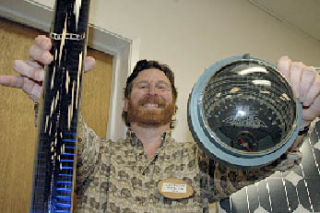Perhaps the most significant fundamental change in modern home building is not the size of the lot or type of wood used in the framing, but how it can tame energy costs and even how it can produce energy
The first part is easy. By installing double-paned windows, plenty of insulation, and by doing laundry at night, tucking rain barrels under gutter pipes and limiting shower times, one can control rising home energy expenditures. The second part is a little harder. How do you get a house to produce energy? There’s wind, there’s hydro, if you happen to live by a river, and then there’s solar. Solar is making a lot of headway as technology grows in spite of the slow-drip of governmental approval and anti-solar lobbying from coal, gas and oil. In the last 15 years, the efficiency of solar panels has doubled and the cost has been cut in half.
To illustrate that growth and to outline how solar power users can sell back extra power, solar power expert Chris Herman will be speaking at the PUD-sponsored Green section at this year’s Fall Home Show at the Everett Events Center.
For 22 years, Herman has been speaking about the benefits, misconceptions and advances of solar power in the nation and Washington. This state is relatively advanced in its pursuit of alternative energy, with entrepreneurs delving into biofuels, wind and electric power. Still, what Washington and the rest of the country does with solar is nothing compared to Germany.
“Germany has installed more electric solar capacity last year than we have in the entire U.S.,” Herman said. “They just know it’s what they want to do.” One of Germany’s best solar resources, Herman added, is not even as good as Forks, one of the rainiest cities in the state with an average annual rainfall of 121 inches.
The solar power infrastructure is in place and it’s cheaper than ever. Outfitting panels on a typical rambler would run about $11,000, not chump change. But Herman and other solar power proponents say it’s one of those long-run decisions, like buying quality windows or a good used car.
Washington state also doesn’t charge tax when a system is bought, and also refunds buyers by buying back electricity. You get 15 cents per kilowatt generated. You get another 3 cents if the inverter the system used is Washington-made. And if your panels were made in the state, then tack on an additional 36 cents, or 54 cents altogether.
The catch is that there are few places in the state that make inverters and panels. There’s Alpha Technologies in Bellingham, JX Crystals in Issaquah and Silicon Energy, a subsidiary of Arlington’s Outback Power. The latter, according to Herman, just sent a batch of panels to Puget Sound Energy’s Wild Horse wind farm that runs along the north shore of the Columbia River.
So why so few places? Why is the country not yet on board with solar? Herman said oil lobbyists and political leaders are suppressing it. In fact a crucial extension on federal tax credits for people who buy panels expires this year as lawmakers continue to stick long-shot items into the bill that act like lead in the bill’s balloon.
“They add things like unlimited loan guarantees for nuclear power plants and provisions for more leases for offshore oil drilling,” Herman said. There’s also media hype. Science reporters like to announce how cheap solar will be in a few years, Herman said, which makes today’s potential buyers hold off on any purchases.
Big oil, though, such as British Petroleum and Shell Oil Co. are investing in solar. Not much, but they are investing. Each spends about 1/5 of what they spend on tar sand research and development. The head of BP said, according to Herman, that the initials BP now stand for Beyond Petroleum. But Herman said, the company is still pursuing drilling in Alaska’s National Wildlife Refuge.
Herman, even after teaching the topic of solar power at the University of Washington for more than 20 years, running his own residential design company, Winter Sun Design, after a term as president of Washington Solar Association, and speaking on solar an average of 15 times a year, is not disheartened. His class sizes at the UW are growing, as is the number of times he gives talks on the subject at public and private venues. And whether John McCain takes office in January or Barack Obama, it doesn’t really matter because, Herman said, “Solar will happen whether they like it or not. We can’t keep trashing the planet,” he said. “Storms are becoming more frequent and severe and the only way to combat that is to quit warming the planet.”








